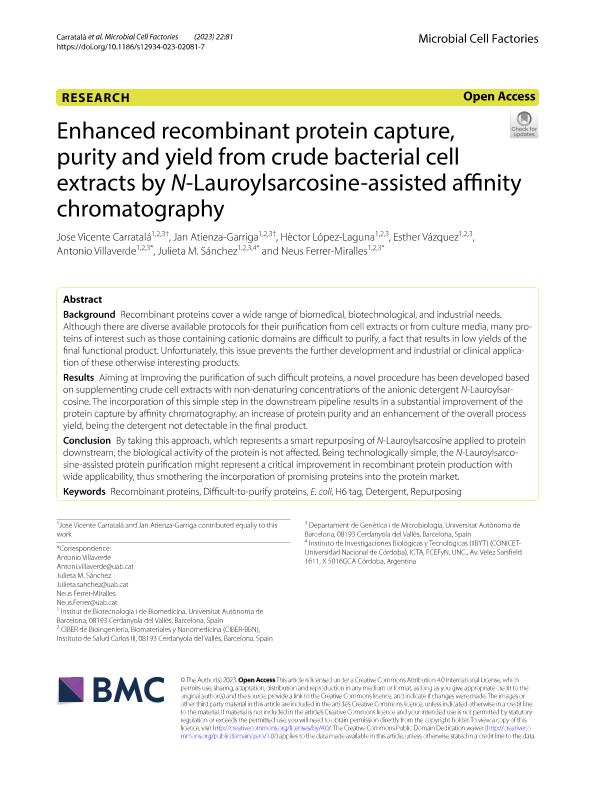Mostrar el registro sencillo del ítem
dc.contributor.author
Vicente Carratalá, José
dc.contributor.author
Atienza Garriga, Jan
dc.contributor.author
López Laguna, Héctor
dc.contributor.author
Vázquez, Esther
dc.contributor.author
Villaverde, Antonio
dc.contributor.author
Sanchez, Julieta Maria

dc.contributor.author
Ferrer Miralles, Neus
dc.date.available
2024-03-14T14:52:22Z
dc.date.issued
2023-04
dc.identifier.citation
Vicente Carratalá, José; Atienza Garriga, Jan; López Laguna, Héctor; Vázquez, Esther; Villaverde, Antonio; et al.; Enhanced recombinant protein capture, purity and yield from crude bacterial cell extracts by N-Lauroylsarcosine-assisted affinity chromatography; BioMed Central; Microbial Cell Factories; 22; 1; 4-2023; 1-14
dc.identifier.issn
1475-2859
dc.identifier.uri
http://hdl.handle.net/11336/230575
dc.description.abstract
Background Recombinant proteins cover a wide range of biomedical, biotechnological, and industrial needs.Although there are diverse available protocols for their purification from cell extracts or from culture media, many pro‑teins of interest such as those containing cationic domains are difficult to purify, a fat that results in low yields of thefinal functional product. Unfortunately, this issue prevents the further development and industrial or clinical applica‑tion of these otherwise interesting products.Results Aiming at improving the purification of such difficult proteins, a novel procedure has been developed basedon supplementing crude cell extracts with non-denaturing concentrations of the anionic detergent N-Lauroylsar‑cosine. The incorporation of this simple step in the downstream pipeline results in a substantial improvement of theprotein capture by affinity chromatography, an increase of protein purity and an enhancement of the overall processyield, being the detergent not detectable in the final product.Conclusion By taking this approach, which represents a smart repurposing of N-Lauroylsarcosine applied to proteindownstream, the biological activity of the protein is not affected. Being technologically simple, the N-Lauroylsarco‑sine-assisted protein purification might represent a critical improvement in recombinant protein production withwide applicability, thus smothering the incorporation of promising proteins into the protein market.
dc.format
application/pdf
dc.language.iso
eng
dc.publisher
BioMed Central

dc.rights
info:eu-repo/semantics/openAccess
dc.rights.uri
https://creativecommons.org/licenses/by/2.5/ar/
dc.subject
Recombinant proteins
dc.subject
Difficult-to-purify proteins
dc.subject
E. coli
dc.subject
H6 tag
dc.subject
Detergent
dc.subject
Repurposing
dc.subject.classification
Bioquímica y Biología Molecular

dc.subject.classification
Ciencias Biológicas

dc.subject.classification
CIENCIAS NATURALES Y EXACTAS

dc.title
Enhanced recombinant protein capture, purity and yield from crude bacterial cell extracts by N-Lauroylsarcosine-assisted affinity chromatography
dc.type
info:eu-repo/semantics/article
dc.type
info:ar-repo/semantics/artículo
dc.type
info:eu-repo/semantics/publishedVersion
dc.date.updated
2024-02-22T14:23:36Z
dc.journal.volume
22
dc.journal.number
1
dc.journal.pagination
1-14
dc.journal.pais
Reino Unido

dc.journal.ciudad
Londres
dc.description.fil
Fil: Vicente Carratalá, José. Universitat Autònoma de Barcelona; España. Instituto de Salud Carlos III; España
dc.description.fil
Fil: Atienza Garriga, Jan. Universitat Autònoma de Barcelona; España. Instituto de Salud Carlos III; España
dc.description.fil
Fil: López Laguna, Héctor. Universitat Autònoma de Barcelona; España. Instituto de Salud Carlos III; España
dc.description.fil
Fil: Vázquez, Esther. Universitat Autònoma de Barcelona; España. Instituto de Salud Carlos III; España
dc.description.fil
Fil: Villaverde, Antonio. Universitat Autònoma de Barcelona; España. Instituto de Salud Carlos III; España
dc.description.fil
Fil: Sanchez, Julieta Maria. Consejo Nacional de Investigaciones Científicas y Técnicas. Centro Científico Tecnológico Conicet - Córdoba. Instituto de Investigaciones Biológicas y Tecnológicas. Universidad Nacional de Córdoba. Facultad de Ciencias Exactas, Físicas y Naturales. Instituto de Investigaciones Biológicas y Tecnológicas; Argentina. Universitat Autònoma de Barcelona; España. Instituto de Salud Carlos III; España
dc.description.fil
Fil: Ferrer Miralles, Neus. Universitat Autònoma de Barcelona; España. Instituto de Salud Carlos III; España
dc.journal.title
Microbial Cell Factories

dc.relation.alternativeid
info:eu-repo/semantics/altIdentifier/url/https://microbialcellfactories.biomedcentral.com/articles/10.1186/s12934-023-02081-7
dc.relation.alternativeid
info:eu-repo/semantics/altIdentifier/doi/http://dx.doi.org/10.1186/s12934-023-02081-7
Archivos asociados
